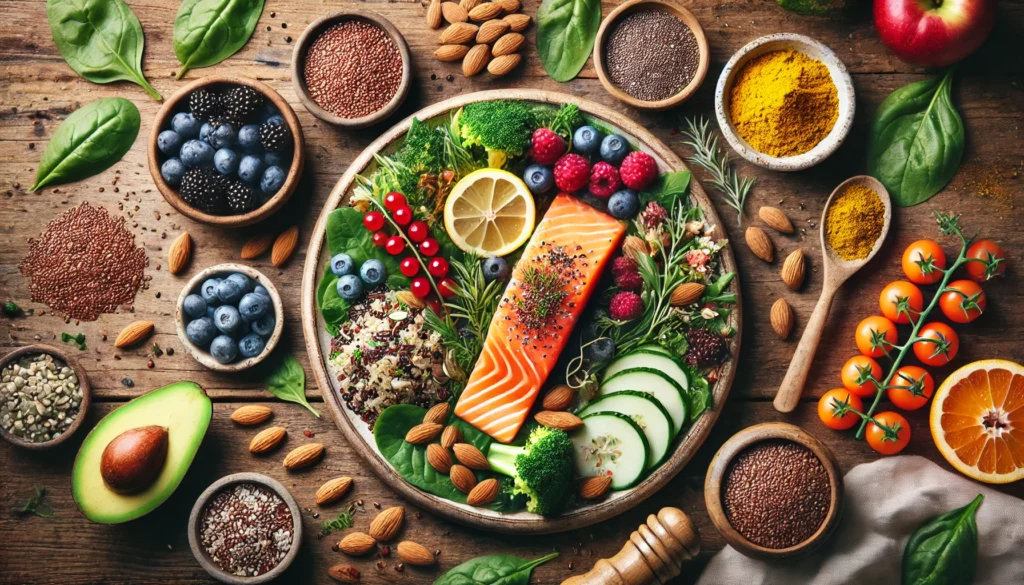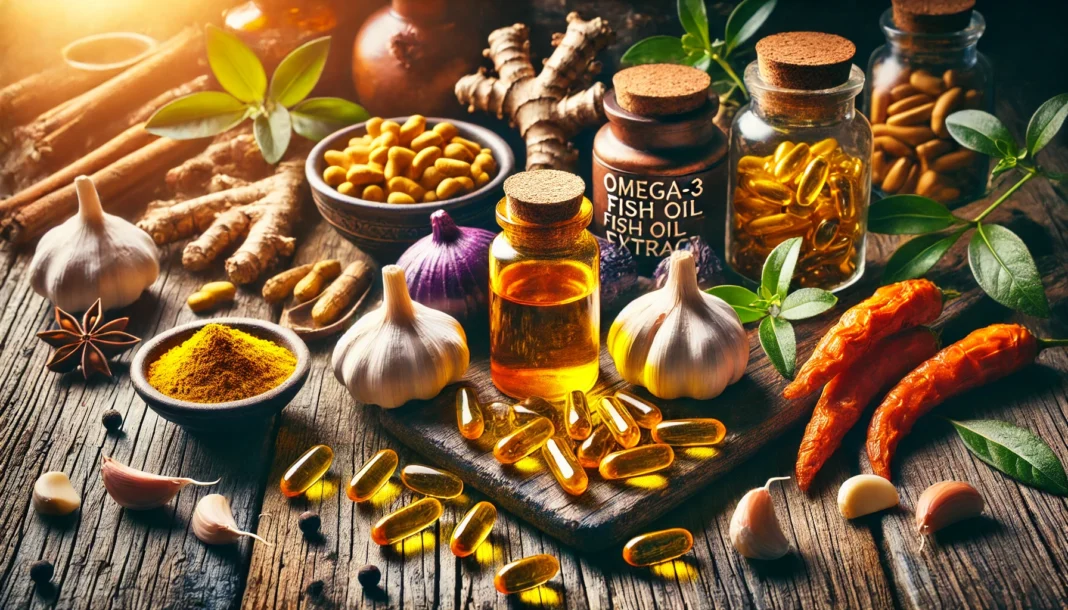Understanding the Impact of A1C and Cholesterol on Health
A1C and cholesterol levels are two crucial biomarkers that provide insight into an individual’s metabolic and cardiovascular health. A1C measures average blood glucose levels over the past two to three months, serving as a key indicator for diabetes management. Cholesterol, on the other hand, is essential for various bodily functions, but imbalanced levels—particularly high LDL (low-density lipoprotein) and low HDL (high-density lipoprotein)—increase the risk of heart disease. Controlling these markers is essential for preventing severe health complications such as stroke, cardiovascular disease, and neuropathy. While pharmaceutical interventions are available, many people seek natural alternatives, particularly bioavailable nutrients and herbs, to regulate these levels effectively.
You may also like: What Supplements Should I Take? The Best Bioavailable Nutrients for Natural Energy and Vitality
The Role of Bioavailable Nutrients in Regulating A1C and Cholesterol
Bioavailability refers to the degree and rate at which a nutrient is absorbed and utilized by the body. When it comes to managing A1C and cholesterol, bioavailable supplements ensure maximum efficacy in metabolic and cardiovascular support. Nutrients like berberine, magnesium, and omega-3 fatty acids have demonstrated remarkable effectiveness in improving insulin sensitivity and lipid profiles. Bioavailable forms of these nutrients, such as magnesium glycinate or high-absorption omega-3s, optimize the body’s ability to regulate blood sugar and cholesterol levels efficiently.

Berberine: A Natural Alternative to Metformin
Berberine, a bioactive compound found in plants such as Berberis and Coptis chinensis, has been extensively researched for its ability to lower A1C and cholesterol. It operates through multiple mechanisms, including activating AMP-activated protein kinase (AMPK), an enzyme that enhances glucose uptake and improves insulin sensitivity. Additionally, berberine modulates gut microbiota, reducing inflammation and supporting healthy lipid metabolism. Studies indicate that consistent use of berberine can lower A1C by up to 1% while simultaneously reducing LDL cholesterol and triglyceride levels.
The Power of Magnesium in Blood Sugar and Lipid Regulation
Magnesium plays a crucial role in over 300 enzymatic reactions, including those involved in glucose metabolism and cardiovascular function. A deficiency in magnesium is linked to insulin resistance and dyslipidemia, both of which contribute to elevated A1C and cholesterol levels. Supplementing with highly bioavailable forms like magnesium glycinate or magnesium malate ensures proper absorption, leading to improved insulin action and lipid balance. Clinical studies have shown that magnesium supplementation reduces fasting blood sugar levels and improves lipid profiles, making it an essential component of holistic metabolic health management.
Omega-3 Fatty Acids: Essential Fats for Metabolic and Cardiovascular Health
Omega-3 fatty acids, particularly EPA (eicosapentaenoic acid) and DHA (docosahexaenoic acid), exert profound benefits on blood sugar and cholesterol regulation. Found abundantly in fish oil and algae-derived supplements, omega-3s reduce inflammation, enhance insulin sensitivity, and lower triglyceride levels. Their cardioprotective properties stem from their ability to decrease arterial plaque formation and improve endothelial function. High-potency, bioavailable omega-3 supplements with a high EPA/DHA ratio ensure maximum therapeutic benefits for individuals looking to manage A1C and cholesterol naturally.
Herbs for High Cholesterol: Nature’s Solution to Lipid Imbalance
Several herbs have demonstrated efficacy in lowering high cholesterol levels while promoting overall heart health. Among the most potent are garlic, turmeric, and fenugreek. These herbs possess bioactive compounds that modulate lipid metabolism, reduce oxidative stress, and improve arterial health. Integrating these into a daily regimen offers a natural and effective strategy for maintaining healthy cholesterol levels without the side effects commonly associated with statin medications.
Garlic: A Natural Cholesterol-Lowering Agent
Garlic contains allicin, a powerful sulfur compound known for its cholesterol-lowering properties. Clinical studies have demonstrated that regular garlic supplementation reduces total cholesterol and LDL while increasing HDL levels. Its ability to prevent plaque buildup in arteries further underscores its role in cardiovascular health. Aged garlic extract, in particular, offers enhanced bioavailability and greater therapeutic effects.
Turmeric and Curcumin: Anti-Inflammatory Powerhouses
Turmeric, and its active compound curcumin, exhibit potent anti-inflammatory and lipid-regulating properties. Curcumin inhibits cholesterol synthesis in the liver while promoting bile production, facilitating the breakdown of excess lipids. Additionally, curcumin’s antioxidant effects protect against oxidative stress, a key contributor to cardiovascular diseases. Bioavailable curcumin formulations, such as those containing piperine for enhanced absorption, ensure maximum efficacy in cholesterol regulation.
Fenugreek: Supporting Healthy Lipid and Blood Sugar Levels
Fenugreek seeds contain soluble fiber and saponins that bind to cholesterol in the digestive tract, preventing its absorption. Additionally, fenugreek enhances insulin sensitivity, making it beneficial for individuals with elevated A1C levels. Studies indicate that fenugreek supplementation leads to a significant reduction in LDL cholesterol while promoting balanced blood glucose levels.

Frequently Asked Questions (FAQ) on Supplements and Herbs for Lowering A1C and Cholesterol
1. What supplement lowers A1C and cholesterol immediately?
While no supplement provides an instant reduction in A1C and cholesterol, certain compounds help improve blood sugar and lipid profiles relatively quickly. Berberine is a powerful natural compound that has been shown to lower both A1C and cholesterol levels within weeks by enhancing insulin sensitivity and lipid metabolism. Cinnamon extract has also been recognized for its ability to regulate blood sugar and improve cholesterol profiles over time. Niacin, a form of vitamin B3, supports HDL (good cholesterol) while helping to lower LDL (bad cholesterol) and triglycerides. Incorporating these supplements alongside a healthy diet and exercise routine enhances their effectiveness.
2. How do herbs for high cholesterol support cardiovascular health?
Many herbs for high cholesterol work by reducing LDL cholesterol, increasing HDL cholesterol, and improving overall heart health. Garlic is a well-studied herb that has been shown to reduce total cholesterol and blood pressure levels. Turmeric contains curcumin, a compound with powerful anti-inflammatory and cholesterol-lowering properties. Fenugreek is another beneficial herb that can help lower cholesterol by reducing the absorption of fats in the digestive system. These herbs, when used consistently, provide natural support for cardiovascular function.
3. Can supplements replace prescription medications for managing A1C and cholesterol?
Supplements and herbs for high cholesterol can be effective in supporting healthy blood sugar and cholesterol levels, but they should not replace prescription medications without medical supervision. Supplements like berberine and alpha-lipoic acid can complement medical treatments and lifestyle modifications. Some individuals have successfully reduced their reliance on medication by combining these natural interventions with a low-glycemic diet and regular exercise. However, it’s important to consult with a healthcare provider before making any changes to prescribed treatments. Personalized strategies ensure both safety and effectiveness in managing health conditions.
4. What are the best herbal supplements for maintaining balanced A1C levels?
Several herbal supplements effectively support balanced A1C levels. Gymnema sylvestre is known for its ability to reduce sugar absorption and improve insulin sensitivity. Bitter melon has been traditionally used to regulate blood sugar by mimicking the effects of insulin. Fenugreek seeds contain fiber and compounds that help slow sugar absorption in the gut. Herbal remedies like these, when incorporated into a well-balanced diet, can help maintain stable A1C levels. A holistic approach that includes lifestyle adjustments further enhances their benefits.
5. How quickly can herbs for high cholesterol show results?
The effects of herbs for high cholesterol depend on the individual, the severity of cholesterol levels, and overall lifestyle factors. Garlic and berberine have demonstrated cholesterol-lowering effects within a few weeks of consistent use. Red yeast rice, a natural statin alternative, typically shows results within 6–12 weeks. Turmeric may take longer to show benefits, but regular intake has been linked to reduced LDL cholesterol and inflammation. Combining these herbs with dietary changes accelerates their effectiveness in improving cholesterol health.
6. What is the best natural supplement to lower A1C and cholesterol together?
Berberine is widely regarded as one of the best natural supplements to lower A1C and cholesterol simultaneously. Studies have shown that berberine improves insulin sensitivity, reduces glucose production in the liver, and lowers LDL cholesterol and triglycerides. Alpha-lipoic acid is another supplement that enhances insulin function while supporting cardiovascular health. Omega-3 fatty acids, commonly found in fish oil, reduce inflammation and improve lipid profiles, making them beneficial for both blood sugar and cholesterol regulation. Using these supplements as part of a balanced lifestyle enhances their impact on metabolic health.
7. How can dietary choices enhance the effects of herbs for high cholesterol?
A diet rich in whole foods, fiber, and healthy fats enhances the effects of herbs for high cholesterol. Foods high in soluble fiber, such as oats, flaxseeds, and legumes, help bind cholesterol and remove it from the body. Nuts and fatty fish provide heart-healthy omega-3s that further support lipid balance. Reducing trans fats and processed foods prevents additional cholesterol buildup. Combining these dietary choices with herbs like garlic and turmeric can create a powerful natural approach to cholesterol management.
8. Are there any risks associated with using supplements to lower A1C and cholesterol?
While many natural supplements are generally safe, they can interact with medications or cause side effects. Berberine, for example, may lower blood sugar too much if taken alongside diabetes medications. Red yeast rice contains naturally occurring statins, which can cause muscle pain or liver issues in some individuals. High doses of niacin can lead to flushing and digestive discomfort. It’s essential to consult with a healthcare professional before starting any new supplement regimen, especially for those with existing health conditions or who take prescription medications.
9. What are some effective combinations of herbs for high cholesterol and blood sugar regulation?
Certain combinations of herbs for high cholesterol and blood sugar regulation provide enhanced benefits. Berberine and milk thistle work well together to improve liver function and regulate blood sugar and cholesterol. Cinnamon and chromium help maintain insulin sensitivity while supporting cardiovascular health. Garlic and omega-3 fatty acids enhance lipid metabolism and reduce inflammation. Incorporating these herbs into a daily routine provides a natural and holistic approach to metabolic health management.
10. Can lifestyle modifications enhance the benefits of supplements for A1C and cholesterol?
Yes, lifestyle modifications significantly enhance the benefits of supplements for lowering A1C and cholesterol. Regular exercise, particularly aerobic and resistance training, improves insulin sensitivity and cardiovascular function. A balanced diet rich in fiber, lean proteins, and healthy fats helps optimize cholesterol and blood sugar levels. Stress management techniques, such as meditation and adequate sleep, support overall metabolic health. Combining these lifestyle habits with targeted supplements creates a comprehensive approach to maintaining long-term wellness.

Conclusion: Integrating Bioavailable Supplements for Optimal Health
Maintaining balanced A1C and cholesterol levels is critical for long-term metabolic and cardiovascular well-being. Natural interventions, particularly bioavailable supplements and herbs, offer a holistic approach to managing these health markers effectively. By incorporating berberine, magnesium, omega-3 fatty acids, and cholesterol-lowering herbs into a daily routine, individuals can support their body’s ability to regulate glucose and lipid metabolism. Choosing high-absorption formulations ensures that these nutrients deliver maximum therapeutic benefits, paving the way for improved health outcomes without reliance on pharmaceutical interventions.
natural supplements for diabetes, best bioavailable nutrients, lowering A1C naturally, cholesterol-lowering herbs, berberine benefits, magnesium for blood sugar, omega-3 for heart health, garlic for cholesterol, turmeric for metabolic health, fenugreek for diabetes, herbal remedies for cholesterol, bioavailable curcumin, insulin sensitivity supplements, heart-healthy supplements, holistic metabolic health, blood sugar regulation, natural cholesterol treatments, best herbs for high cholesterol, lowering triglycerides naturally, herbal heart health solutions
Further Reading:
Cholesterol-lowering supplements may be helpful
Cinnamon extract lowers glucose, insulin and cholesterol in people with elevated serum glucose
What are the best supplements for lowering cholesterol?
Disclaimer
The information contained in this article is provided for general informational purposes only and is not intended to serve as medical, legal, or professional advice. While NewsHealthWatch strives to present accurate, up-to-date, and reliable content, no warranty or guarantee, expressed or implied, is made regarding the completeness, accuracy, or adequacy of the information provided. Readers are strongly advised to seek the guidance of a qualified healthcare provider or other relevant professionals before acting on any information contained in this article. NewsHealthWatch, its authors, editors, and contributors expressly disclaim any liability for any damages, losses, or consequences arising directly or indirectly from the use, interpretation, or reliance on any information presented herein. The views and opinions

